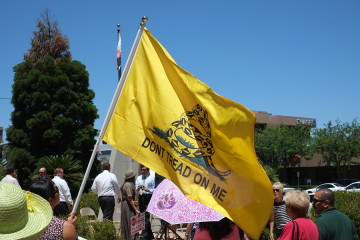*Didn’t Like Iraq War? Then Trust Me on Iran Deal, Obama Says

©2015 Bloomberg News
NSMOJB6K50Y1
(Bloomberg) — The linchpin of President Barack Obama’s defense of the international nuclear agreement with Iran amounts to: I told you so.
Obama rode to the White House in 2008 on his early, vocal and mostly lonely opposition to the U.S. invasion of Iraq in 2003. More than a decade later, he says the fight over the Iran deal is with the same group of neoconservative politicians and commentators who beat the drum for war over diplomacy to meet what turned out to be a non-existent threat in Iraq.
Listening to them again on Iran, he argued in a speech Wednesday in Washington, would be another historic mistake.
“More than a decade later, we still live with the consequences of the invasion of Iraq,” Obama said at American University, the same venue where in 1963 President John F. Kennedy called for a recalibration in the Cold War with the Soviet Union. “I raise this history because now, more than ever, we need clear-thinking in our foreign policy.”
Obama and his aides have invoked some of the most prominent proponents of going to war in Iraq: former Vice President Dick Cheney to former United Nations Ambassador John Bolton and Bill Kristol, founder of The Weekly Standard.
Kristol is unapologetic either for his support for the Iraq invasion or his opposition to the deal with Iran.
Failing the Test
“Obama’s free to re-litigate Iraq,” Kristol said Wednesday before the president spoke. “But he’s losing the argument over Iran.”
“Obama said Iran couldn’t be permitted a nuclear weapons infrastructure,” Kristol said in an e-mail. “Obama condemned Iranian terrorism. Obama denounced Iran for killing Americans in Iraq. Obama signed the sanctions legislation. Obama said he had Israel’s back. The deal fails all these tests.”
Bolton called Obama’s speech a “classic effort at misdirection” aimed at scaring Democrats into line on the Iran agreement.
“I think he believes that invoking the term ’Iraq’ and what the Bush administration did is sufficiently intimidating to Democrats that he can keep them from deserting him in large numbers,” Bolton said in a phone in interview after the address. “He believes that’s the magic formula. But it’s comparing apples to oranges, at the least.”
‘Scare Tactics’
Another backer of the 2003 Iraq invasion, Arizona Republican Senator John McCain, dismissed Obama’s arguments in a statement Wednesday opening his Armed Services Committee hearing on the Iran agreement.
The administration, he said, “suggests that any criticism of this deal is tantamount to a call to war. Such scare tactics are to be expected from this administration, but they have no place in a debate of this magnitude.”
Not all Iraq war supporters are opposing the Iran deal. Among the lawmakers who voted in favor of the resolution authorizing the use of military force in Iraq at the time were Vice President Joe Biden, Secretary of State John Kerry and former top U.S. diplomat Hillary Clinton, now the leading contender for the Democratic presidential nomination.
Obama said in his Wednesday address that his critics were repeatedly wrong in assessing threats from Iraq and Iran. Rejecting the Iran deal would unravel economic sanctions that forced the Islamic Republic to negotiate, accelerate its nuclear program and hurt U.S. credibility in the world, he said.
‘Drumbeat of War’
The U.S. must “resist the conventional wisdom and the drumbeat of war, worry less about being labeled weak, worry more about getting it right,” he said.
Obama also said he takes seriously the “incendiary” rhetoric and behavior of Iran, but said a superpower shouldn’t act in response to the taunts of Iranian hardliners who are trying to exploit the divisions within the U.S.
“It’s those hardliners chanting ‘Death to America’ who have been most opposed to the deal,” he said. “They’re making common cause with the Republican caucus.”
In anticipation of a vote in the Republican-led Congress to disapprove the accord next month, Obama and his allies are girding against a well-funded campaign to influence lawmakers by groups including the American Israel Public Affairs Committee. They also face adamant opposition by the Israeli government.
The agreement announced last month in Vienna between Iran, the U.S. and five other world powers eases sanctions in return for verifiable limits on the Islamic Republic’s nuclear program.
Obama has vowed to veto a resolution of disapproval if Congress passes one at the end of a 60-day review period that ends in mid-September.
Democratic Votes
He is counting on Democrats to ensure the deal survives. At least 44 House Democrats and 13 Senate Democrats would have to side with all Republicans against Obama to override a veto.
In his speech, Obama said a rejection of the agreement by Congress would leave the U.S. standing alone and Iran in a stronger position.
“Those who say we can just walk away from this deal and maintain sanctions are selling a fantasy,” he said.
Aipac on Wednesday distributed a memo citing polls that suggest Americans are increasingly skeptical of the deal.
Just over half of Americans believe the Iraq war was a mistake, according to a Gallup poll conducted in June. Polls on the Iran deal have shown varying levels of support, depending on how the question is framed.
A CBS News poll released Tuesday found that almost half of Americans don’t know enough about the deal to form an opinion. Among those with an opinion, opponents outnumber supporters 33 percent to 20 percent.
‘Historically Consequential’
The Iran agreement “is historically consequential for the national security of the United States,” Hardin Lang, a former diplomat and researcher at the Center for American Progress, a Washington group which backs the agreement, said in a telephone interview. “I spent a couple of years in Iraq, and I think people need to understand the gravity of the choice before us.”
Obama explicitly drew a parallel with Kennedy’s 1963 address, which urged Americans to support a nuclear test-ban treaty with the Soviets despite deep suspicion and animosity.
“ We do not want a war,” Kennedy said. “This generation of Americans has already had enough — more than enough — of war and hate and oppression.”
Obama said the standoff with the Soviet Union was much more dangerous than the threat posed by Iran. Kennedy, he said, rejected the idea of “security with perpetual war footing” for “a practical and attainable peace.”
The Iran agreement “builds on this tradition of strong, principled policy diplomacy,” Obama said.
Opponents are unlikely to succeed at killing the deal, Bolton said. Instead, the campaign to discredit the accord would lay groundwork for the U.S. to back out of it, should Republicans win the presidency next year.
“It’s important to get as many votes against the deal as possible to give a Republican president in January 2017 the ability to say the American people don’t support the deal,” and try to rescind it, Bolton said.
–With assistance from Justin Sink in Washington.
To contact the reporters on this story: Margaret Talev in Washington at mtalev@bloomberg.net; Toluse Olorunnipa in Washington at tolorunnipa@bloomberg.net To contact the editors responsible for this story: Craig Gordon at cgordon39@bloomberg.net Joe Sobczyk, Justin Blum
**********************************************************
Frankly, I think that Mr. Obama knows very little about strong or principled anything, much less diplomacy. –W.







No Comment